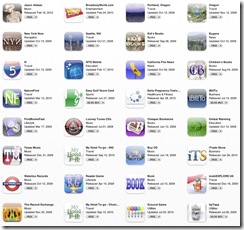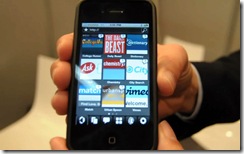Like so many other disruptions Apple has brought to telecom, the success of its mobile app store has grown to become the envy of network providers. If there is an example of how service providers can be relegated to the position of access provider with little-to-no participation in the high margin applications that are being bought and sold over the network, it is the mobile app store
Allowing a mobile subscriber to download Skype software from a mobile app store must, for network operators, be like handing a life-long adversary a pistol and allowing him to point and fire. However, such is the nature of direct interaction that mobile app developers through branded stores have with end-users, that network operators are virtually powerless to stop it.
Worldwide mobile app store revenue is projected to triple to more than US$15.1 billion this year and reach US$58 billion in three years, according to Gartner.
The research firm says revenue will be generated both from end users buying applications and applications themselves generating advertising revenue for their developers.
Worldwide mobile app store downloads are projected to more than double to 17.7 billion downloads in 2011 from an estimated 8.2 billion downloads last year. By the end of 2014, Gartner expects over 185 billion applications to have been downloaded from mobile app stores, since the launch of the first one in July 2008.
Apple’s App Store is estimated to have driven close to nine application downloads out of 10 in 2010 and will remain the single best-selling store across the forecast period (through 2014), although to a lesser extent, as other stores manage to gain momentum, according to Carolina Milanesi, research vice president at Gartner.
In January, Apple said over 10 billion apps had been downloaded from its App Store by more than 160 million iPhone, iPod touch and iPad users worldwide.
According to Gartner, Android market, Nokia’s Ovi Store, Research In Motion’s (RIM’s) App World, Microsoft Marketplace and Samsung Apps are the key competitors that saw the number of application downloads grow in 2010.
Now the likes of Research In Motion (RIM) have entered the fray, with the handset manufacturer having announced that the BlackBerry App World service has launched in the UAE, offering BlackBerry smartphone customers easy access to a broad range of mobile applications. The service is now available in a number of Middle East countries including UAE, Kuwait, Qatar, Jordan, Bahrain and Lebanon.
BlackBerry App World, the official on-device app store for BlackBerry smartphones, allows customers to discover, download and enjoy applications that are purpose-built for their BlackBerry smartphones.
In a region such as the Middle East, where the device market is not controlled by network operators in the same way as it is in markets in Western Europe and North America, the introduction and development of mobile app capabilities are often communicated independently of any network operator announcements on the topic.
In the case of Nokia, however, the handset manufacturer chose to make a recent announcement regarding the availability of its Ovi in the Middle East, in cooperation with UAE telco Etisalat. Nokia has had a difficult time in the smartphone segment, and its choice to make its regional Ovi announcement with Etisalat may be viewed as a weaker mobile app store owner looking to form as many allegiances as possible in order to shore up its offering.
Nokia and Etisalat said that through their ongoing collaboration, consumers across the Middle East would soon be able to purchase content from the Ovi store with billing directly to their mobile phone account. Etisalat subscribers would have the choice to pay for any applications via their Etisalat account and the costs would be automatically accrued. The service will either be charged as part of the customer’s monthly bill for post paid accounts, or deducted from their prepaid airtime credit.
The Ovi store allows consumers to download mobile games, applications, videos, images and personalised content to their Nokia devices and Nokia smartphones. Over 35,000 items are now available for download by consumers, with over four million downloads a day globally with steady growth also in the Middle East region. The content is a combination of free and paid for. 
Worldwide mobile app store downloads are projected to more than double to 17.7 billion downloads in 2011 from an estimated 8.2 billion downloads last year
In addition to operator billing through Etisalat, consumers will continue to have the existing payment option via credit card. The operator billing will be available in the UAE, Saudi Arabia and Egypt during 2011 and the cooperation will be extended to other Etisalat operations in the Middle East and Africa region going forward.
“The mobile apps space is a two-sided business,” says Sanyu Kiruluta, team leader developer relations EMEA, for BlackBerry. “There are revenues coming from Internet providers/content providers to the operator, not just consumers paying operators,” she adds.
However, the participation in incremental revenues, driven by mobile app purchases and usage is insignificant for network operators, as the bulk of the margin is retained by the app developer or store owner.
The power wielded by Internet companies and handset manufacturers, particularly those excelling in the smartphone space, is growing all the time, and network operators are going to have to address the power shift promptly or risk becoming increasingly marginalised in a domain they once had complete control over.
For example, there are over 35 million BlackBerry Messenger subscribers globally, which works out at above 60 per cent penetration amongst BlackBerry users, according to Kiruluta. Around 1.5 million new users are being added a month, and while BlackBerry subscribers are often high ARPU subscribers who pay a subscription fee over to the network operator, BlackBerry Messenger use remains a revenue leakage point.
The fact that RIM may extend BlackBerry Messenger use to mirror online messaging offerings, which incorporate voice and video calling at no additional charge to users will only raise the angst of network operators regarding the lack of control they exercise over end-user spending patterns.





0 comments ↓
There are no comments yet...Kick things off by filling out the form below.
Leave a Comment